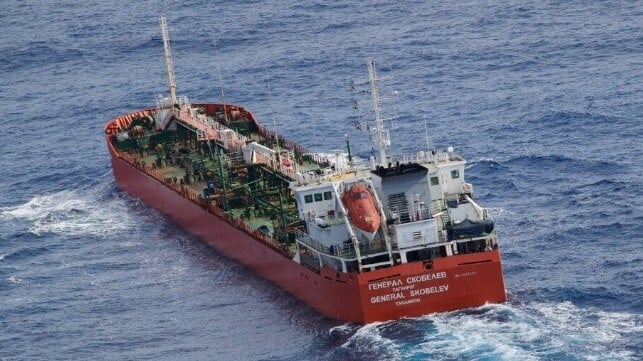UK Asks Brokers to Give Up Profitable "Dark Fleet" Tanker Sales

More than a few Western tanker brokers have had a profitable run since the imposition of restrictions on Russia's oil trade. Over the course of the past two years, Russia-serving operators have built up a 750-strong "dark fleet" of aging secondhand tankers, often paying outsize prices for scrap-ready tonnage. Many of these deals have been negotiated through London-based brokerage houses, and the UK's Department for Business & Trade is encouraging industry-leading brokers to forego the profits associated with Russia-linked business and comply with sanctions measures instead. To clarify its expectations, it has issued a list of the telltale signs of a "dark fleet" sale, echoing past industry news coverage and analysts' reports.
The Western sanctions on Russian oil include a ban on facilitating cargoes valued over $60 per barrel. Since most cargoes are now sold for more than that limit, and U.S. and UK authorities have begun enforcing the ban, Western tanker owners and insurers have been stepping away from the Russian oil trade. This has prompted a new constellation of Russia-serving operators to amass their own fleet by quietly buying up used Western tonnage, typically using opaque ownership structures in permissive third countries.
We are visually monitoring a Russian tanker that has been blacklisted by US Department of Treasury's Office of Foreign Assets Control (OFAC).
— TankerTrackers.com, Inc. (@TankerTrackers) May 27, 2024
The vessel is laden with 1 million barrels of Russian crude oil and hiding in digital darkness as her AIS transponder has been switched… pic.twitter.com/tKbpCql9A3
"Some of these tankers may be old (15+ years) and sold at a significant premium above the historic market price for these types of tankers given Russia’s urgent requirements for vessels. As such this market is likely to remain lucrative to prospective sellers," noted the agency. "It will therefore be important for industry actors to be mindful of this context, capturing it within any due diligence processes."
Tankers are a "restricted good" under sanctions on Russia, and the agency reminded brokers that they are not allowed to facilitate these transfers, even when the sale takes place through an intermediary or a third nation. Well-known risk factors to watch for include:

that matters most
Get the latest maritime news delivered to your inbox daily.
- high prices for older vessels
- unusual country of ownership, or country of ownership linked to the existing "dark fleet"
- vague or fraudulent documentation
- obscure, complex ownership structures
- buyer linkages to restricted goods, Russian interests, or sanctioned business partners
- Unusual or opaque payment methods
- Buyer reticence or lack of transparency during the due diligence process
- High-risk trade patterns and destinations, including ports adjacent to sanctioned countries, voyages outside of normal trade patterns, or nations known to tolerate sanctions violations
"Industry participants are advised only to conclude deals where they are confident that a process of cross-checking of these risk indicators provide reassurance that compliance thresholds are met," warned the department. "Any non-compliance with UK sanctions is a serious offense and punishable through large financial penalties or criminal prosecution."
